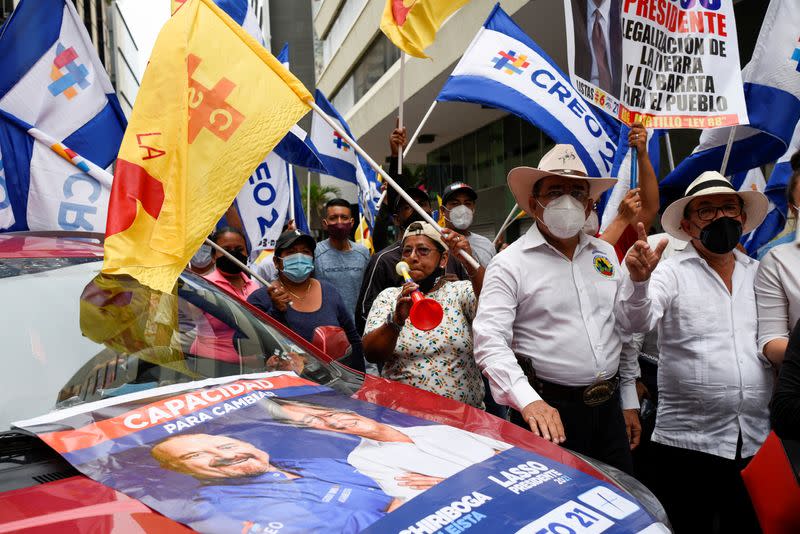Factbox: Leading candidates in Ecuador's presidential election

QUITO (Reuters) - Ecuador on Sunday holds elections for president and legislature in which voters will choose between maintaining the market-focused policies of the last four years or returning to the socialist policies in place during the preceding decade.
The president who takes office in May will face an economic crisis exacerbated by the effects of the coronavirus pandemic, high unemployment and rising poverty.
The latest polls give the lead to Andres Arauz, who is backed by left-wing former president Rafael Correa. Banker Guillermo Lasso trails behind him, with indigenous activist Yaku Perez in third place.
The following are key facts about the leading candidates:
ANDRES ARAUZ
The thirty-five-year-old economist has promised to return the country to the social spending and assistance programs of the Correa era, in part by rolling back an austerity plan linked to an International Monetary Fund financing agreement.
He joined the Correa administration at age 22, and rose through the ranks to hold middle management positions in the economy and planning ministries and in the central bank. In 2017, he moved to Mexico to get a doctorate in financial economics but cut short his studies to run for president.
Born in Quito to a middle-class family, Arauz is married with one child and plays the accordion.
His platform includes a promise to give $1,000 to a million families upon taking office, as well as to hike taxes on large companies and increase the regulatory power of the state.
GUILLERMO LASSO
A two-time presidential candidate, Lasso has promised to spur the economy by increasing foreign investment in private industry and boosting output of oil, the South American nation's most important export.
Lasso, the youngest of 11 children, was born into a middle-class family from Guayaquil. At age 15, he started working at the Guayaquil Stock Exchange and rose through Ecuador's finance industry to become president of the Bank of Guayaquil, which he ran for nearly 20 years.
Married with five children, Lasso also had a brief stint at the local subsidiary of Coca-Cola and served for a short time as economy minister in the 1990s.
Lasso, 65, lost the presidency in 2013 to Correa by a wide margin and in 2017 narrowly lost to current president Lenin Moreno.
YAKU PEREZ
Lawyer Yaku Perez is running on promises to ban industrial mining near rivers, and has spent years leading environmental protests that have led him to get arrested six times.
The 51-year-old widower and father of two girls was born Carlos Perez but three years ago changed his name to Yaku, which means "water" in the Cañari Quichua language.
He repeatedly clashed with the Correa government due to his opposition to industrial mining.
He also carried out a legal battle that led to the suspension of the Rio Blanco mining project in the province of Azuay, where he for years participated in community efforts to ensure that Andean villages have access to water.
"My fight has been for water, and for defending it I was imprisoned. For the love of water, I changed my name," reads his website, where he promotes seven books that he has written.
He hopes to launch a nationwide referendum that would prohibit mining near watersheds.
Perez says he will get Ecuador out of the economic crisis by recovering money stolen by previous governments. His campaign slogan is "There's enough money when no one steals."
(Reporting by Alexandra Valencia; editing by Diane Craft)


